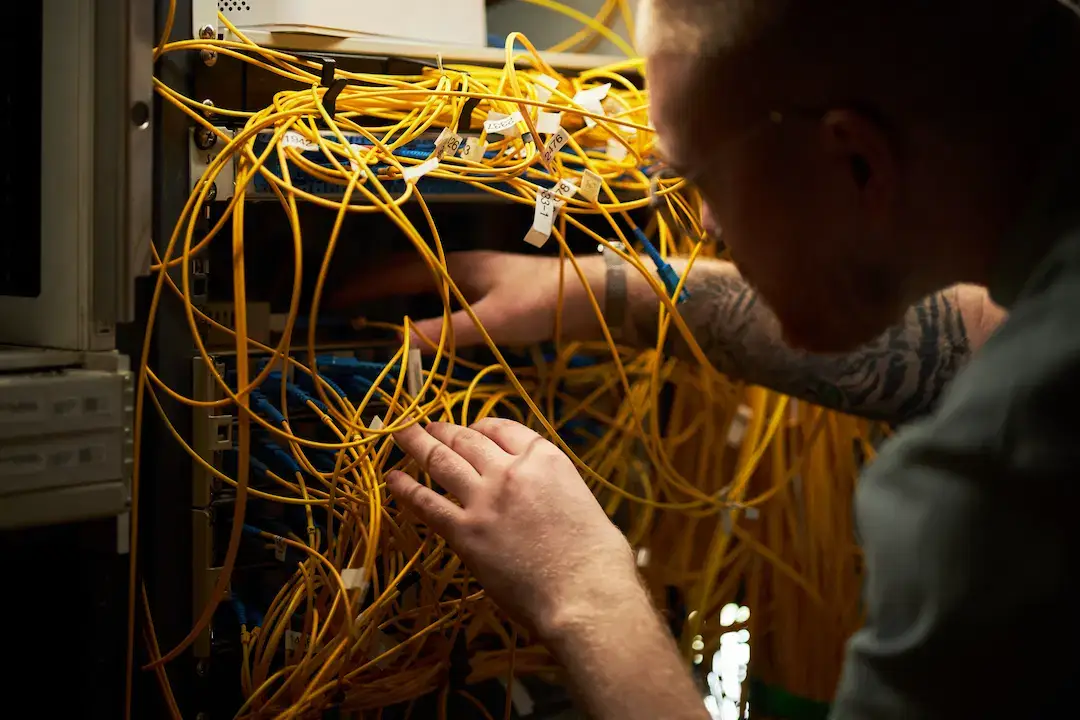Voice over Internet Protocol (VoIP) phone systems have revolutionized business communication, yet several common VoIP myths persist. The perpetuation of such myths causes confusion and hesitation among potential users. We’re here to debunk the myths and misconceptions surrounding VoIP. This article provides clarity and empowers you to make informed decisions about your communication needs. After all, who wants to live in the dark ages of traditional phone systems?
Introduction to VoIP Myths
It’s a common misconception that VoIP is just another tech fad. In reality, today’s VoIP technology is a robust, reliable, and cost-effective communication solution for businesses of all sizes. Before you let any unfounded fears hold you back, let’s uncover the truth about this essential business tool.
What is VoIP?
VoIP, or Voice over Internet Protocol, is a technology that lets you make phone calls over a broadband internet connection instead of traditional phone lines. Carolina Digital Phone provides cloud-based Hosted VoIP services, offering flexible, scalable, and cost-effective communication solutions.
Importance of Debunking Myths with Facts
Debunking common VoIP myths is crucial for businesses seeking to modernize their communication infrastructure. By dispelling these misconceptions, businesses can make informed decisions about whether to switch to VoIP, ultimately improving efficiency, reducing costs, and gaining a competitive edge.
Overview of Common Misconceptions
Many myths and misconceptions surround VoIP, ranging from concerns about call quality to perceived difficulties in installation and reliability. We aim to tackle each common misconception head-on, providing clear explanations and demonstrating how modern VoIP systems overcome these perceived challenges with today’s VoIP technology.

Myth #1: VoIP is Less Reliable Than Traditional Phone Systems
One of the most persistent myths about VoIP is that it’s less reliable than traditional phone systems. This misconception refers to early VoIP technology and experiences with unstable internet connections. However, modern VoIP systems have significantly improved in reliability, offering a superior communication solution.
Understanding Call Quality
Concerns about call quality are common when considering a switch to VoIP. Early VoIP technology sometimes suffered from inconsistent sound quality due to bandwidth limitations and network congestion. However, today’s high-speed internet and advanced VoIP technology have largely eliminated these issues.
Factors Affecting Reliability
The reliability of VoIP phone systems depends on several factors, including the stability of your internet connection, the quality of your VoIP phone service provider, and the robustness of their network infrastructure. Carolina Digital Phone commits to 99.999% uptime, ensuring minimal disruptions to your business communication.
Debunking the Reliability Misconception
The myth that VoIP is less reliable is simply outdated. With a stable high-speed internet connection and a reputable VoIP provider, VoIP calls are as reliable, if not more so, than traditional phone lines. In fact, our commitment to 99.999% uptime guarantees that your business communication remains consistently available.

Myth #2: VoIP is Difficult to Install
Another common VoIP myth is that installing a VoIP phone system is a complex and daunting task. While early VoIP setups may have been cumbersome, modern VoIP systems are designed for easy installation and management, making them accessible even for small businesses with limited IT resources.
Installation Process of VoIP Phone Systems
The installation process of VoIP phone systems has become increasingly streamlined. Unlike traditional phone systems, which require extensive wiring and on-site hardware, modern VoIP solutions often utilize simple plug-and-play devices and cloud-based configurations, simplifying setup.
Common Pain Points During Installation
One common pain point during the installation of a new business phone system is the potential disruption to day-to-day operations. Luckily, service providers like Carolina Digital Phone minimize these disruptions through careful planning, expert support, and user-friendly interfaces, ensuring a streamlined installation process.
How VoIP Providers Simplify Setup
VoIP phone service providers simplify the setup process by offering comprehensive support and user-friendly interfaces. From initial consultation to ongoing maintenance, VoIP providers ensure a smooth transition, minimizing downtime and maximizing the benefits of switching to VoIP services.
Myth #3: VoIP is Expensive
One prevalent myth about VoIP is that it is expensive. It’s a common misconception that traditional phone systems are cheaper, but this is far from the truth. Today’s VoIP technology can significantly reduce your phone expenses, making it a budget-friendly option for businesses of all sizes.
Cost Comparison: VoIP vs. Traditional Phone Systems
When evaluating costs, it’s essential to look at the overall package. Carolina Digital Phone provides a cloud-based VoIP system that lowers expenses, such as system maintenance and hardware costs. Hosted VoIP services are a budget-friendly communication solution, making VoIP an intelligent choice.
Hidden Costs of Traditional Phones
Traditional phone systems often come with hidden costs that businesses may not immediately recognize. These can include hefty maintenance fees, expensive hardware upgrades, and long-distance call charges. Switching to VoIP eliminates many of these unpredictable expenses, providing cost certainty.
Budget-Friendly VoIP Offers
A VoIP phone system enables modern, cost-effective phone communication, dispelling the common myth that VoIP is expensive. With various pricing plans tailored to meet different business needs, finding a VoIP phone service provider that fits your budget is easy. These VoIP offers include advanced features.
Myth #4: VoIP Requires High-Speed Internet
Another common VoIP myth is that you need lightning-fast internet to use it effectively. While a stable internet connection is necessary, you don’t always need a super-expensive, high-speed setup. Understanding the bandwidth requirements of modern VoIP systems will help debunk this misconception.
Understanding Bandwidth Requirements
Understanding bandwidth requirements is crucial when considering a VoIP phone service. Early VoIP technology demanded significant bandwidth, but modern VoIP systems operate efficiently by using advanced compression techniques to minimize data usage without compromising sound quality. This is why VoIP isn’t what you thought.
VoIP and Existing Internet Connections
In many cases, businesses can use VoIP with their existing internet connections. Before you switch to VoIP, assess your current internet speed and bandwidth. Most standard business internet plans can easily handle VoIP calls, especially with the optimized modern VoIP systems offered by Carolina Digital Phone.
VoIP Solutions for Low-Speed Internet
Even if you have relatively low-speed internet, VoIP is still an option. Some VoIP service providers offer solutions optimized for lower-bandwidth environments. These VoIP services use advanced codecs and compression to maintain high call quality, even with limited internet bandwidth.
Myth #5: You Can’t Keep Your Existing Phone Number with VoIP
A prevalent common myth about VoIP is that you must abandon your existing phone number when you switch to VoIP. Keeping an existing phone number is a significant concern for many businesses. If your business relies on a phone number that has been in place for some time, changing it can lead to lost customers and branding confusion. However, debunking this particular myth is easy.
Porting Your Number to VoIP
Porting your number to VoIP is not only possible but also a standard practice with most VoIP phone service providers. The process involves transferring your existing phone number from your current provider to your new VoIP service, ensuring a seamless transition for your business communication.
Benefits of Keeping Your Existing Number
Keeping your existing number offers numerous benefits. It maintains brand consistency, prevents customer confusion, and avoids the hassle of updating contact information across all your marketing materials. Keeping your number and using VoIP ensures a smooth transition without disrupting business operations.
Steps to Transfer Your Number
Transferring your number to a VoIP phone system typically involves a few simple steps. These often include:
- Confirming that your number is eligible for porting with your VoIP provider.
- Providing the necessary documentation, such as your current phone bill, and following the provider’s instructions to complete the transfer.
Myth #6: VoIP is Only for Large Businesses
It’s a common fallacy that Voice over Internet Protocol, or VoIP, is exclusively for large businesses. This concept simply isn’t true! Modern VoIP systems are scalable and flexible, making them a perfect communication solution for businesses of all sizes. From startups to enterprises, VoIP has something to offer.
VoIP Solutions for Small Businesses
Small businesses can significantly benefit from VoIP, as it offers cost-effective, advanced features without the hefty price tag of traditional phone systems. VoIP offers, such as those from Carolina Digital Phone, provide smaller businesses with the same powerful tools enjoyed by larger corporations, leveling the playing field.
Scalability of VoIP Phone Systems
Scalability is a key advantage of modern VoIP systems. Carolina Digital Phone offers flexible and scalable Hosted VoIP services. Whether you’re a small business with a few employees or a growing company adding staff regularly, VoIP can easily adapt to your changing needs, ensuring your communication infrastructure keeps pace.
VoIP as a Communication Solution for All
VoIP isn’t just for large corporations; it’s a versatile communication solution for all. Small businesses can now enjoy the benefits of advanced features, cost savings, and scalability. Embrace VoIP technology and transform how your organization communicates, regardless of size or industry.
Myth #7: VoIP is Just a Fad
One of the most persistent common myths about VoIP is that it’s just a passing fad. This misconception couldn’t be further from the truth. With its long history and continuous evolution, VoIP technology is here to stay, offering a reliable and innovative solution for business communication.
The History of VoIP Technology
The history of VoIP technology dates back several decades, with early VoIP experiments laying the foundation for today’s sophisticated systems. Carolina Digital Phone was founded in 2000 and has a long history in the VoIP phone service industry. The evolution of VoIP has been steady, transforming communication.
Current Trends and Future of VoIP
Current trends in VoIP focus on enhancing unified communications, integrating with other business tools, and improving the user experience. Carolina Digital Phone continuously evolves its services, including Hosted VoIP, UCaaS (Unified Communications as a Service), and managed IT services to meet the ever-changing needs of modern businesses.
Why VoIP is Here to Stay
VoIP is more than just a fad; it’s a fundamental shift in how businesses communicate. As technology advances, VoIP services remain at the forefront, delivering cost savings, improved flexibility, and advanced features that traditional phone systems simply cannot match. The shift to VoIP is here to stay.
Conclusion: Embracing VoIP Technology
In conclusion, embracing VoIP technology is a smart move for any business looking to modernize its communication infrastructure. By debunking the common VoIP myths, we hope to encourage companies to switch to VoIP and unlock its many benefits. Modern VoIP systems offer reliability, scalability, and cost-effectiveness.
Final Thoughts on Common VoIP Myths
It’s a common misconception that surrounds VoIP phone systems. By debunking the common myths, you can make an informed decision about whether to use VoIP. Remember, these myths are often based on outdated information, and today’s VoIP technology has overcome these limitations.
Encouraging Businesses to Switch to VoIP
We encourage every business, large or small, to consider switching to VoIP. The advantages of VoIP, including cost savings, enhanced features, and improved scalability, make it a superior communication solution compared to traditional phone systems. Embrace the future with today’s VoIP technology!
Carolina Digital Phone is a leader in VoIP technology, and our experts are happy to speak with you. Making the switch from traditional telephony technology, or an outdated on-premise system can be overwhelming. As you explore your options, be sure to consult with an expert and get the facts. Use Carolina Digital Phone as a resource to make an informed decision. Call us today at (336) 544-4000.


